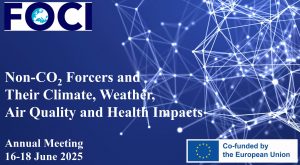Project Description

The FOCI project aims to improve knowledge of individual and cumulative contribution of non-CO2 radiative forcers and their precursors. The FOCI main goals are to assess impact of key radiative forcers, where and how they arise, processes of their impact on the Earth’s climate system. The FOCI objectives include the following:
(1) to examine and evaluate the climate relevant processes and feedback of anthropogenic primary and secondary radiative forcing species, natural aerosols and BVOCs based on new and available observations; (2) to integrate observational and modelling datasets and data products for improving and evaluating multiscale climate and atmospheric composition models; (3) to improve and evaluate Earth system, regional climate and atmospheric composition models; (4) to improve tailored emission inventories for non-CO2 radiative forcers and scenarios using innovative coupled modelling frameworks; (5) to undertake innovative and regionally relevant integrated analysis of optimised mitigation strategies, to support climate policy, deriving multiple benefits, quantifying sensitivity of climate system tipping points, meeting global challenge of stabilising global temperatures, and minimising the associated impacts on climate, weather, air quality and health; (6) to implement a global outreach, dissemination and stakeholder engagement strategy; (7) to guarantee efficient project implementation and delivery of its outcomes.
On 16 June 2025, the FOCI project was presented by the coordinators with overall progress of the project, followed by overview/ progress of the WPs – (WP1): Processes controlling climate change impacts of anthropogenic non-CO2 species; (WP2): Processes controlling climate change impacts of natural non-CO2 species; and (WP3): Improvements in Earth system modelling for climate applications – and finished by discussions on cross-cutting activities among the three WPs.
On 17June 2025, the meeting continued with overviews/ progress of the WPs – (WP4): Regional model improvement and evaluation for quantifying multiscale impacts of non-CO2 forcers; (WP5): Multiscale emissions processing and development of scenarios for model projections; (WP6): Multiscale projections to quantify contributions and impacts on climate, weather, air quality and health; (WP7): Integrated analysis of innovative, optimised mitigation options to support climate policy; (WP8) Global dissemination, communication and engagement with stakeholders – and discussions on cross-cutting activities among these WPs. The day finished by the FOCI Project Advisory Board Meeting and general discussions.
On 18 June 2025, the last day of the annual meeting, a summary of next/upcoming tasks was discussed among the participants. At the end the administrative tasks (WP9) were discussed as well as separate meeting of the Project Management Team with closing discussions (incl. possibility of the project extension) and inputs from the Project Advisory Board.
Text: by Alexander Baklanov, Alexander Mahura, UHEL-INAR
